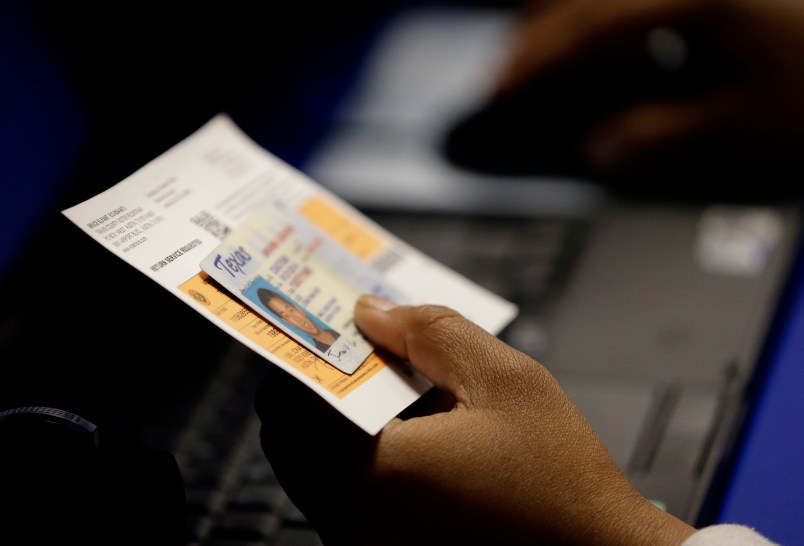The biggest change to the Texas law — which accepts handgun licenses as sufficient identification to vote, but not college student IDs — is that voters without any acceptable photo ID can still cast a ballot so long as they sign an affidavit. Opponents and a federal judge in Texas balked at the revisions, saying criminal penalties tied to lying on the affidavit could have a chilling effect on voters.
U.S. Circuit Jones Edith Jones said the lower court went too far.
“The district court relied too heavily on evidence of Texas’s state-sponsored discrimination from a bygone era,” Jones wrote in her majority opinion.
The revisions to Texas’ law were also supported by the U.S. Justice Department — a move that amounted to a complete reversal for the federal government, which under former President Barack Obama had joined minority rights groups in suing over the law. But two months after Donald Trump took office, the Justice Department abandoned the argument that Texas passed voter ID rules with discrimination in mind and said the changes should satisfy the courts.
Opponents bristled at the ruling but didn’t immediately indicate their next step.
“We continue to firmly believe that the Texas photo ID law is one of the most discriminatory and restrictive measures of its kind,” said Kristen Clarke, president of the Washington-based Lawyers’ Committee for Civil Rights Under Law, one of the groups involved in the lawsuit.
Texas first passed the voter ID law in 2011, the same year the GOP-controlled Legislature adopted voting maps that were also struck down as discriminatory. Republican Attorney General Ken Paxton said Friday’s ruling “removes any burden on voters who cannot obtain a photo ID.”
The law was twice shot down by U.S. District Judge Nelva Gonzales Ramos — an appointee of then-President Barack Obama — who ruled that the strict requirements disadvantaged minorities and effectively dampened the electoral power of Texas’ surging Hispanic population. She also disapproved of the modified version, which makes knowingly lying on the affidavit to vote a misdemeanor.
Democrats said that provision could keep people home on Election Day over fears of incorrectly filling out a form. Republicans call those concerns unfounded but have also supported aggressive action against voter fraud, which is rare. Earlier this year, a Texas woman was sentenced to five years in prison for voting in the 2016 presidential election when she was ineligible because she was on probation.
Thirty-four states have laws requiring or requesting that voters show some form of identification at the polls, according to the National Conference of State Legislatures. Arkansas’ newly blocked law would have required officials to provide photo identification to voters free of charge if they didn’t have any other photo ID. It also would have let voters without ID to cast provisional ballots by signing affidavits.
Pulaski County Circuit Judge Alice Gray, however, ruled there was no guarantee those provisional ballots would be counted and that they would face greater scrutiny.
___
Follow Paul J. Weber on Twitter: www.twitter.com/pauljweber







Jones is a conservative activist Jesus-freak clown and white nationalist racist prick and she was appointed by Reagan via a piece of court-packing legislation:
“In her opinions, she has questioned the legal reasoning which legalized abortion, advocated streamlining death penalty cases, invalidated a federal ban on possession of machine guns and advocated toughening bankruptcy laws. In 2006, Chief Judge Jones found that a death row inmate who had filed a pro se motion to drop his appeal while his attorney was abroad, could not later reinstate his appeal.”
“A group of civil rights organizations and legal ethicists filed a complaint of misconduct against Jones on June 4, 2013, after she allegedly said that “racial groups like African-Americans and Hispanics are predisposed to crime,” and are “prone to commit acts of violence” which are more “heinous” than members of other ethnic groups.[10][11] According to the complaint, Jones also stated that a death sentence is a service to defendants because it allows them to make peace with God and she “referred to her personal religious views as justification for the death penalty”.[12] Jones allegedly made the remarks during a speech to the University of Pennsylvania Federalist Society. However, the speech was not recorded, and the ethics complaint was based solely on affidavits from audience members.[13]”
“The district court relied too heavily on evidence of Texas’s state-sponsored discrimination from a bygone era,”
Teatroll Rosetta Stone: “It’s not racism when we do it NOW. We get to say racism is dead because you forced us to put up with a black POTUS for 8 years.”
“She compared anyone who buys the argument that Texas lawmakers intentionally passed a racist law to “Area 51 alien enthusiasts.””
Imbecile who believe there’s no such thing as racism if they’re not running around announcing it:
“For instance, Jones argued that if Texas lawmakers’ original intent was to discriminate against minority voters, wouldn’t that have been explicit somewhere in the legislative record? “The district court had access to thousands of pages of internal legislative decision-making memoranda and comments and emails and so on,” Jones said. “There is nothing that says, ‘We are trying to advantage white voters over all other voters.’ Isn’t that proof there is no discriminatory intent?””
Came here to say something similar. She’s long outlasted the amount of time she should’ve been on that court. The Fifth Circuit really needs a dramatic overhaul.
Oh, and that quote you highlighted about racist intent needing to be explicit? These conservative religious nutcases on that court are experts at hearing the dog whistles and protesting that all is above board. They’re also sending dog whistles to the bigots that they can get away with discriminatory behavior as long as they hide it a bit.
Edited: of course I misspelled “here.”
So, what Texas is telling us is that we should arm College Students…